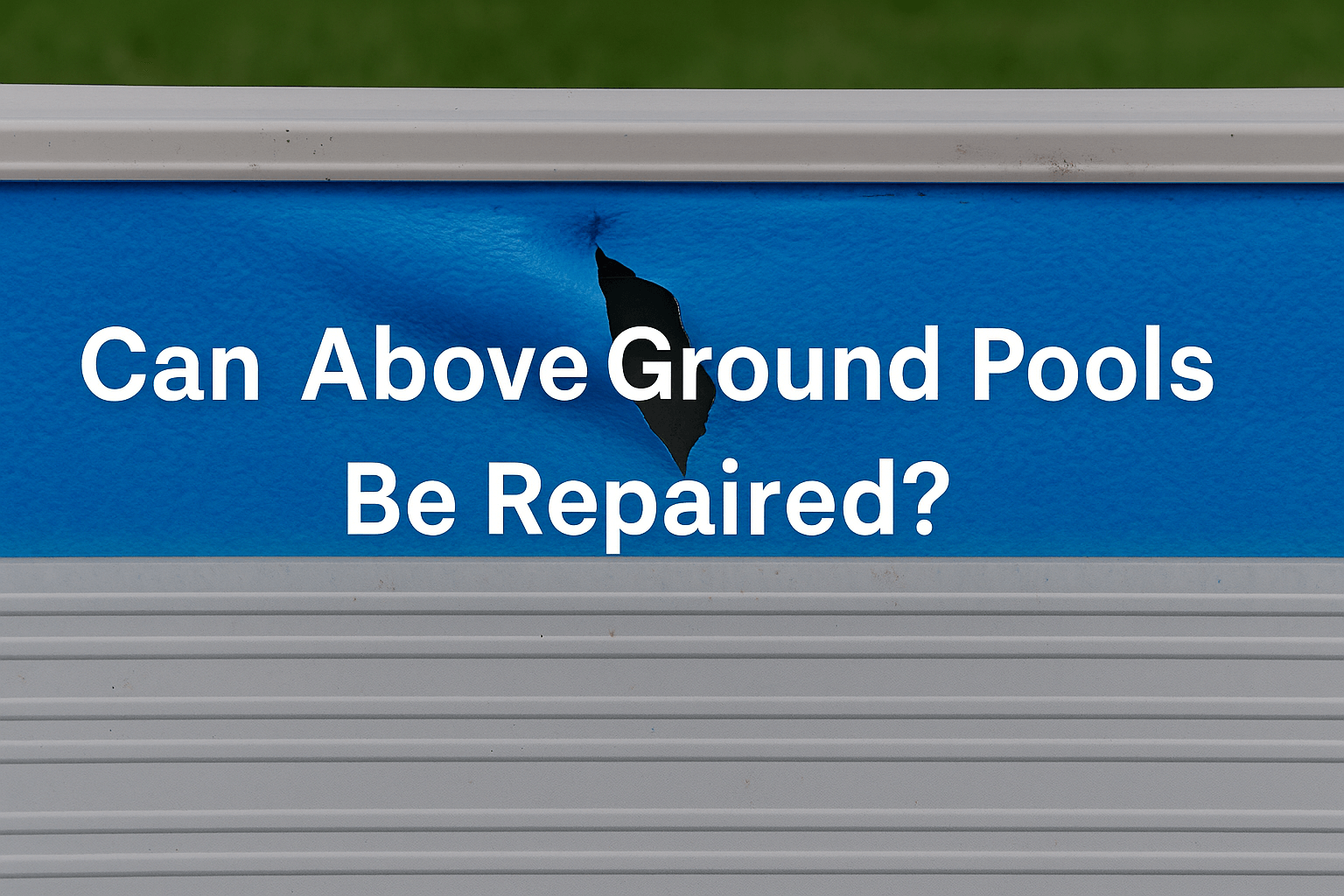
Can Above Ground Pools Be Repaired?
Spotted a leak in your portable small swimming pool and felt your summer dreams slip away? Don’t panic — yes, above ground pools can be repaired! From patching liners to fixing frames, it’s often easier (and cheaper) than you think. Stick around for the how-to, the when-to, and the DIY secrets.
Common Repairs for Above Ground Pools
Repairing the Pool Liner
Patching Small Holes and Tears
Liner tears are like grazed knees — annoying but usually fixable.
They often happen thanks to a stray stick, pool toy, or even overenthusiastic cannonballs.
Start by checking the liner carefully. Look for tears, tiny punctures, or weird colour changes — especially in the corners or along the seams.
Here’s what you’ll need for a quick patch-up:
-
Pool liner patch kit
-
Liner glue
-
Scissors
-
A clean, dry cloth
The fix is simple:
-
Dry the area completely.
-
Apply glue to the damaged spot.
-
Stick on the patch — make sure it’s smooth and centred.
-
Let it dry fully before refilling the pool.
We’ve seen families do this in under 30 minutes — while the kids impatiently wait in their swimsuits.

When Is a Full Liner Replacement Necessary?
If your liner’s older than your youngest child, patching might not cut it.
Deep cracks, widespread fading, or repeated leaks usually mean it’s time for a replacement.
Think of it like a worn-out shoe — you can only glue it back together so many times.
A pool specialist can help you decide if a fresh liner is the better long-term choice.
Fixing Rust and Structural Damage
Repairing Rust on Steel and Metal Walls
Rust is the silent saboteur of above ground pools — it creeps in slowly but causes big problems if ignored.
It often shows up near water lines, under skimmers, or anywhere moisture lingers.
Light surface rust? Sand it down, apply a rust-inhibiting primer, and repaint.
Heavy rust that compromises the structure? That’s when you’ll want a pro’s input.
Keeping the pool dry over winter and balancing chemicals helps prevent it returning.
Dealing with Bent or Damaged Support Frames
A bent support beam might not seem urgent... until the pool starts leaning like the Tower of Pisa.
Sometimes, a gentle nudge with a rubber mallet is enough to straighten things out.
But if a wall is buckled or a frame has snapped, it’s safer to replace the part or consult a repair service.
Don’t take chances with structural issues — especially when water and kids are involved.

DIY vs. Professional Repairs
Common Repairs You Can Do Yourself
Some fixes are simple enough to tackle with a cuppa in one hand and a toolkit in the other.
You can usually DIY:
-
Small liner patches
-
Tightening leaky fittings
-
Replacing basic hardware like screws or clamps
Pro tip: Always turn off the pool pump before touching anything. We’ve seen too many “learning the hard way” stories online.
When to Call a Professional Pool Service
If you're staring at a pool wall that looks like it went twelve rounds with a cricket bat, it’s time to call in the cavalry.
Also call a pro if:
-
You can’t find the leak
-
Plumbing’s involved
-
The repair requires draining the entire pool
Yes, you might pay more upfront. But it can save time, stress, and even future damage down the line.

Is Repairing Your Pool Worth It?
Assessing the Cost of Repairs
Weighing Repair Costs Against the Price of a New Pool
Let’s be real — some repairs aren’t cheap.
If your pool is newer and the issue is minor, a repair makes perfect sense. But if the liner’s worn, the walls are rusting, and you’ve patched it more times than you can count... it might be smarter to invest in a new setup.
On average, repairing a liner or replacing a wall section costs far less than a whole new pool — but every case is different.
The Role of Your Pool’s Age and Brand
Brands matter. Some models have affordable replacement parts, while others cost more to fix than to replace.
If your pool’s been around for 10+ years, parts might be harder to source. It’s worth checking what’s available before you commit to repairs.
Think of it like fixing an old car — sometimes the sentimental value wins, but sometimes the maths just doesn’t add up.
Getting Professional Advice
Still unsure? You’re not alone.
Many pool owners second-guess whether to repair or replace. A quick consultation with a pool technician can make the decision much easier.
They’ll spot issues you might miss and give you honest advice based on the pool’s condition — not just guesswork.
Final Thoughts
Pools bring joy, laughter, and sometimes the odd headache. But when something breaks, it doesn’t mean summer’s over.
Regular check-ups, quick fixes, and knowing when to ask for help will keep your pool safe and splash-ready for years to come.
And if you ever find yourself knee-deep in water wondering what went wrong — remember: even the best pool owners have been there.
The key is taking action. Your future self (and your future paddling kids) will thank you for it.
Have you checked out our other posts?
Can Above Ground Pools Be Recycled?
Can Above Ground Pools Be Left Out In The Winter?
How Do Above Ground Pools Work?
How Are Above Ground Pools Made?



Leave a comment